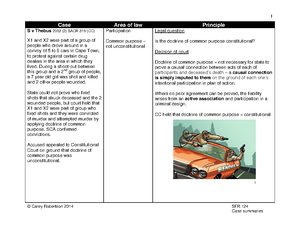- Information
- AI Chat
Was this document helpful?
Past Paper MCQ - MCQ questions for criminal law
Course: Criminal law (LAWS 2014)
941 Documents
Students shared 941 documents in this course
University: University of the Witwatersrand, Johannesburg
Was this document helpful?

Question 1
X is constantly plagued by thoughts of committing crimes. He keeps a journal in which he writes down his
criminal desires. Can X be held criminally liable for this conduct?
a) Yes. Any slight manifestation of conduct including the utterance of words is sufficient to hold X liable.
b) No. Mere thoughts are not punishable until they translate into action. There is no legally relevant conduct
for the purposes of criminal liability in this example.
c) Yes. The actus reus has been met by X writing down his thoughts and mens rea exists because X foresees the
possibility that he could hurt someone.
d) Yes. Criminal law is primarily concerned with the prevention of crime.
e) No. Criminal law is not concerned with trivialities.
Question 2
On 12 January 2006, X anally penetrated a 7-year-old girl. At the time, South African law confined the
definition of rape to the vaginal penetration of a female by a male. When X appears before court in respect of
the charge of indecent assault because it could not be rape, the presiding officer is of the view that the
definition of rape is unconstitutional to the extent that it excludes anal penetration. Can X be convicted of
rape?
Which one is correct?
(1) As a consequence of the finding of constitutional invalidity, X can be convicted of rape.
(2) Despite the finding of constitutional invalidity, X cannot be convicted of rape.
(3) The new definition of rape is only applicable to someone who commits the offence after the declaration of
constitutional invalidity.
(4) Even after the declaration of constitutional invalidity, X can only be convicted of indecent assault.
a) All the statements are correct.
b) Only statements (2), (3) and (4) are correct.
c) Only statements (1), (2) and (4) is correct.
d) Only statement (3) is correct.
e) All the statements are incorrect
Question 3
Circumstance or “formally defined” crimes are crimes in which:
a) The consequence is criminalised and not the act.
b) Causation is not required because it is the conduct that is prohibited and not the consequence.
c) Negligence in the form of fault is required.
d) Mens Rea is always required.
e) All the elements of a crime are required to be proven including causation and fault.
Students also viewed
- B-and-Others-v-Minister-of-Correctional-Services SA 1997
- Masiya v Director OF Public Prosecutions, Pretoria AND Another ( Centre FOR Applied Legal Studies AND Another, Amici Curiae) 2007 (2) SACR 435 (CC)
- Criminal Law Fault Culpa Notes
- LAW OF Delict CASE LAW - work
- S v Skhosana - Case law on evidence
- Participation in crime
Related documents
- S V Masiya - This is a very important case and is hard to find. It is part of your criminal
- 267 Definition Murder is the unlawful and intentional causing of the death of another human being
- Criminal law exam notes, semester 2 work only
- S v Butkus and Others ( Hcmdcriminaliappcal 53 of 2018 ) 2019 Nahcmd 173 (28 May 2019 )
- Q3 - 1st semeser test
- Eastern Cape Development Corporation v Cotterell NO and Others (EL5182023) 2024 Zaecellc 11 (16 April 2024)



![Clarke v Hurst NO AND Others [1992] 4 All SA 763 (D)](https://d20ohkaloyme4g.cloudfront.net/img/document_thumbnails/0596bbffd4597ee36ba94ceb2f65be6c/thumb_300_425.png)











